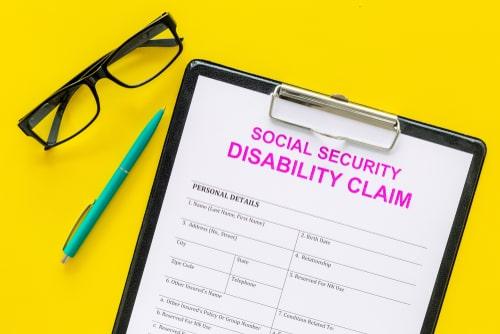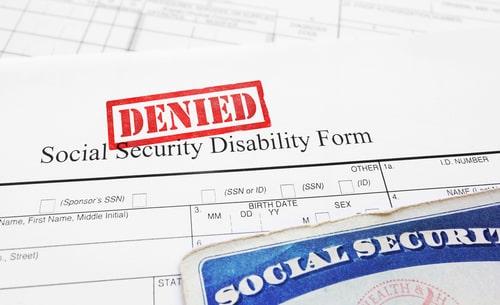33 N. Dearborn Street, Suite 1130, Chicago, IL 60602
5 Convenient Locations
Recent Blog Posts
Past Relevant Work Change

Social Security has made important changes to the rules regarding past relevant work for disability determinations, effective June 22, 2024:
- Shorter Evaluation Period: The period considered for past relevant work (PRW) has been reduced from 15 years to 5 years. Now, only the jobs you held in the last five years before your disability application will be evaluated (SSA). Changes To Past Relevant Work and Disability Determinations | SSA
- Duration of Work: Work is no longer considered relevant if it lasted fewer than 30 calendar days. Short work attempts that do not provide substantial work experience will not be counted against you. SSR 24-2p (ssa.gov).
3 Common Misconceptions About Social Security Disability Benefits

Social Security disability benefits can be an essential resource for people who cannot fully support themselves due to physical or mental health conditions. However, there are many misconceptions surrounding the process of applying for and receiving these benefits. If you are planning to apply for disability benefits, it is critical to have accurate information in order to make informed decisions about your financial future. Here are some common misconceptions about Social Security disability benefits that you should know about:
When Can SSD Applicants Receive Compassionate Allowances?

Social Security provides financial support to people in multiple situations, including individuals who are unable to work due to a disability. However, it can sometimes take months, or even years, to receive approval for Social Security disability (SSD) benefits. Fortunately, the Social Security Administration (SSA) has established a compassionate allowances program to expedite the claims process for those with certain severe medical conditions. This may allow certain people to have their applications for disability benefits approved more quickly than they would be under normal circumstances. It is important for disability applicants to understand when compassionate allowances may be available and the steps they can take to ensure that they receive the financial assistance they need.
If I Have HIV, Can I Qualify for Social Security Disability Benefits?

HIV, or Human Immunodeficiency Virus, is a virus that attacks the body’s immune system, and an HIV infection can lead to Acquired Immune Deficiency Syndrome (AIDS). While HIV infections are incurable, in recent years, advancements in medicine have made it possible for many people with HIV to live longer, healthier lives. However, people living with HIV may still experience complications that affect their ability to maintain gainful employment, and they may qualify for Social Security disability benefits if they meet certain criteria.
How Can Concentration Issues Affect a Social Security Disability Claim?

There are numerous conditions that may limit a person's ability to maintain gainful employment, and when these issues are severe enough, a person may qualify for Social Security disability benefits. However, when applying for disability benefits, a person will need to demonstrate that their condition has limited their ability to work. Multiple factors may be evaluated when determining whether a specific condition is considered to be a disability, and in many cases, a key issue to address will be whether a person can maintain concentration, persistence, and pace while working. Understanding exactly what this means and demonstrating how concentration and pacing issues affect you can be crucial to secure the necessary benefits.
UPDATE: Autonomic Neuropathy and Disability Benefits
 Originally published: February 3, 2012 -- Updated: November 28, 2022
Originally published: February 3, 2012 -- Updated: November 28, 2022
Update: As discussed below, autonomic neuropathy can occur if a person experiences damage to the nervous system that disrupts various automatic bodily functions, including internal organs such as the heart or digestive system. While autonomic neuropathy may not be considered to be a disability on its own, its effects and the related conditions a person is likely to experience may be severe enough to qualify for Social Security disability benefits. Some disabling conditions that may meet the criteria to be considered disabilities include:
- Autoimmune disorders - Autonomic neuropathy may occur due to conditions such as lupus or rheumatoid arthritis. These conditions may be considered disabilities if they affect two or more organs or bodily systems and cause a person to experience symptoms such as severe fatigue, involuntary weight loss, and fevers or if a person has a "marked" limitation on their ability to maintain a consistent pace while working, function socially, or perform daily activities.
Who May Qualify for Social Security Disability on Mental Health Grounds?
 A mental health condition can have a severe impact on your ability to work and earn enough to support yourself. Many people who struggle with serious mental health disorders find that they are not able to stay in any position for more than a few weeks or maybe months at a time. Mental illness can make it impossible for a person to get out of bed and dressed for work every day, the same way a physical illness can. Psychological disorders can also impact a person’s behavior while they are working, leading to trouble.
A mental health condition can have a severe impact on your ability to work and earn enough to support yourself. Many people who struggle with serious mental health disorders find that they are not able to stay in any position for more than a few weeks or maybe months at a time. Mental illness can make it impossible for a person to get out of bed and dressed for work every day, the same way a physical illness can. Psychological disorders can also impact a person’s behavior while they are working, leading to trouble.
Many people with mental health-related disabilities have been dismissed from a number of positions due the clear impact of their mental health on work performance. If you are affected by a mental health condition that affects your ability to work, you may be eligible for Social Security Disability. An attorney can help you gain a better understanding of who does and does not qualify for this benefit based on their mental health.
How Does Social Security Evaluate Mental Functional Capacity?

There are multiple different conditions that can affect a person's ability to work and earn enough money to support themselves and their family. Fortunately, disability benefits are available through Social Security for those who are totally disabled. However, demonstrating that a condition is severe enough to be considered a total disability is not always easy, especially for mental conditions that are not always outwardly obvious.
One issue that will often play a significant role in these cases is a person's residual functional capacity, or RFC. The RFC is basically a measure of what a person can still do, despite their condition. It is important to note that the RFC does not consider whether or not a person can actually find work; rather, it focuses on whether they would be able to perform work if they were given the opportunity. By understanding the factors considered by Social Security when evaluating a person's mental functional capacity, an applicant for disability benefits can make sure they meet the required criteria.
Social Security Adds 12 New Compassionate Allowance Conditions
On August 15, 2022, the Social Security Administration SSA added 12 new Compassionate Allowance (CAL) conditions. The conditions are:
- Angioimmunoblastic T-cell Lymphoma,
- Blastic Plasmacytoid Dendritic Cell Neoplasm,
- Gerstmann-Straussler-Scheinker Disease,
- Microvillus Inclusion Disease – Child,
- Mowat-Wilson Syndrome,
- Myelodysplastic Syndrome with Excess Blasts,
- NUT Carcinoma,
- Pfeiffer Syndrome – Types II and III,
- Pontocerebellar Hypoplasia,
- Posterior Cortical Atrophy,
- Renal Amyloidosis – AL Type,
- Sarcomatoid Mesothelioma.
Per the SSA press release, “The Compassionate Allowances program quickly identifies claims where the applicant’s condition or disease clearly meets Social Security’s statutory standard for disability. Due to the severe nature of many of these conditions, these claims are often allowed based on medical confirmation of the diagnosis alone. To date, more than 800,000 people with severe disabilities have been approved through this accelerated, policy compliant disability process, which has grown to a total of 266 conditions.”
How Does Social Security Evaluate Physical Functional Capacity?
 If you have a physical impairment that has made it impossible for you to find or maintain employment, you may be able to receive government benefits to address your disability. These benefits are provided through the Social Security Administration. Social Security disability benefits are based on your inability to work due to your medical condition. In order to qualify for Social Security disability, you must prove that you cannot maintain gainful employment because of your limitations.
If you have a physical impairment that has made it impossible for you to find or maintain employment, you may be able to receive government benefits to address your disability. These benefits are provided through the Social Security Administration. Social Security disability benefits are based on your inability to work due to your medical condition. In order to qualify for Social Security disability, you must prove that you cannot maintain gainful employment because of your limitations.
One way that Social Security evaluates whether you are capable of working is through a residual functional capacity (RFC) assessment. This is an evaluation of what you can still do despite your limitations. The purpose of the residual functional capacity assessment is to determine the level of work you are still able to engage in on a regular and continuing basis. It is important to understand the factors that are considered in an assessment and how the findings of an assessment may affect your Social Security disability case.






 312-999-0999
312-999-0999 312-999-8999
312-999-8999




